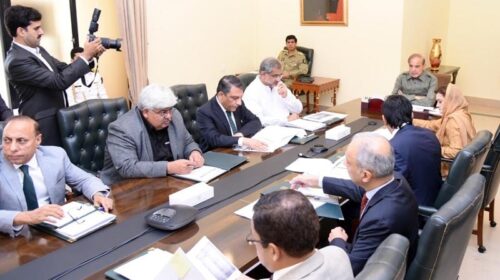Mr Sharif ordered that even high loss-making areas be provided with full power supply during this period, even though he was alerted that it would have an additional impact on tariff.
It is expected that the power sector will start receiving about 700 mmcfd of LNG instead of about 500 mmcfd at present.
Secondly, the prime minister also asked the finance ministry to provide funds to the power sector as per agreed timelines to facilitate urgent maintenance and repairs and payments to fuel suppliers and independent power producers (IPPs).
The ministry would now arrange required funds to facilitate both fuel and power suppliers out of committed subsidies and grants.
Meanwhile, two major outages — at Port Qasim and Thar Engro coal-fired power plants — would be overcome.
Half of the Port Qasim capacity returned to the system on Tuesday while Engro would be back on line on April 28. The Sahiwal coal-based power plant is also available, but its coal stock is being conserved for utilisation during Eid days.
The meeting was informed that nine units shown on forced outages belonged to the old generation companies, which were too expensive to be utilised but would now become operational under the prime minister’s orders.
Mr Sharif also agreed to the suggestions of the power division that there was an urgent need for educating consumers on energy conservation and controlling expensive power consumption through changing habits, as the cost of imported fuels — including coal, LNG and furnace oil — was too expensive and therefore a unit saved was more prudent than a unit generated.
This should flow from the top, but it was not immediately clear who would steer such a conservation campaign.
Ms Aurangzeb said Imran Khan and his government were responsible for the ongoing energy crisis because neither they repaired technical faults nor arranged LNG, diesel and furnace oil. As a result, when the previous government was ousted, 27 power-generating units of 5,500 megawatts capacity were out of order due to faults and a total of 1,100 MW were unavailable for generation because of fuel shortages or repair.
“The team of mafia, incompetent and corrupt could not contract LNG and furnace oil when they were the cheapest ever,” the information minister said, adding that 20 out of those 27 units were now back on stream within two weeks.
Within days, the new government had also lined up LNG cargoes, which would start flowing into the network by May 7 and the energy shortage would come under control, she said.
She said if the previous government had arranged fuel and lined up diesel supplies, there would have been no load-shedding and no need for hoarding of diesel today. She said Prime Minister Sharif had also ordered the administrative machinery to be vigilant and act against diesel hoarders.
On the other hand, the Oil and Gas Regulatory Authority (Ogra) said on Tuesday it had taken “cognisance of the reports on diesel non-availability” and had moved its enforcement teams along with law enforcement agencies and the district management in different regions to inspect and unearth illegal oil storages.
“It is reiterated that anyone found in hoarding or stocking oil illegally shall be dealt under the law of the land,” Ogra said.
It said chief secretaries had been asked to advise deputy commissioners for increasing vigilance on any such illegal activity and take immediate punitive actions.
Moreover, district coordination officers (DCOs) have also been directed to mobilise teams to inspect petrol stations, act against those involved in hoarding or short supply, and send reports to Ogra.
Ms Aurangzeb said the prime minister directed the authorities concerned to resolve all the issues pertaining to load-shedding by April 30 so as to ensure a smooth and uninterrupted power supply to consumers and advised that an integrated and sustainable fuel system should be put in place to meet the requirements of power generation and also a plan keeping in view the hot season in particular.
Consultation with ruling allies
Separately, Prime Minister Shehbaz Sharif continued to consult ruling allies on Tuesday to seek their suggestions to rid the country of multiple crises and put the crippling economy back on track.
The prime minister held separate meetings with coalition partners. Delegations of the Muttahida Qaumi Movement (MQM) and Pakhtunkhwa Milli Awami Party (PkMAP) met him at Prime Minister House.
Mr Sharif also met legislators Afzal Khokhar, Shiza Fatima and Engineer Ameer Muqam.
PM talks to Bill Gates
Later, Prime Minister Sharif on Tuesday talked to American business magnate Bill Gates, co-chair of the Bill & Melinda Gates Foundation (BMGF), by phone.
The ongoing public health and social sector programmes supported by BMGF in Pakistan were discussed, including polio eradication and the foundation’s support for improving immunisation, nutrition and financial inclusion services in the country.
Noting that only one case of polio was recorded in 2021, the prime minister stressed that his government remained committed to eradicating all forms of polio from the country.
He expressed grave concern about this year’s first case of poliovirus, which was recently confirmed in a child in North Waziristan after 15 months.
He noted that a special emergency response plan for south Khyber Pakhtunkhwa was already under implementation to scale up and improve the quality of the polio eradication programme and increase the security of frontline health workers.
Mr Gates acknowledged the positive progress and reiterated the foundation’s continued support to Pakistan for ensuring that no child is at risk of paralysis due to poliovirus.
Recalling polio-related challenges faced by Afghanistan, the prime minister expressed satisfaction with the resumption of polio vaccination campaigns in Afghanistan. He underlined the need for adequate international support for Afghanistan in that regard.







